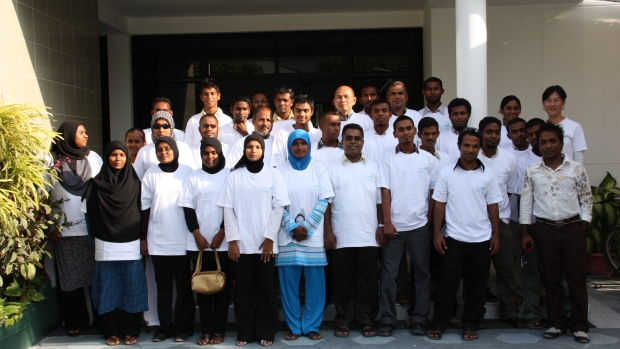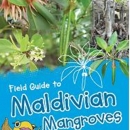Grants :: Small Grant Facilities :: A print media awareness campaign to protect mangrove habitats in the Maldives
A print media awareness campaign to protect mangrove habitats in the Maldives

Print media awareness campaign , Maldives © MFF, 2009
Objectives
The objectives of this project were:
- to collect reference materials on mangrove habitats in the Maldives;
- to visit selected islands to determine the extent of their mangroves, identify the threats to these forests, assess how local people use mangroves, and share knowledge;
- to hold meetings with key government stakeholders to identify policies on protecting, conserving and managing mangrove habitats; and
- to develop awareness materials and disseminate them to island residents.
Background
The mangrove forests of the Maldives play a vital role in sustaining coastal and island ecosystems. Yet they have come under great pressure from population growth and development, in some cases being seen as little more than waste dumps and nuisances. A general lack of awareness of the importance of mangrove ecosystems means they are widely undervalued.
With better environmental awareness these threats could be managed. By using different forms of highly visible print media, it should be possible to educate people and thereby relieve some of the pressure on mangrove habitats. A media campaign could also influence government to formulate and implement stronger policies to protect and sustainably manage not just mangroves, but also natural resources generally.
The long-term goal of this project, therefore, was to ensure that the Maldives’ mangroves are maintained as healthy ecosystems through stronger, more effective public awareness and policies.
Target beneficiaries
Local communities and NGOs on the target islands.
Outputs
- Compilation of reference materials on mangroves, including field guides, books, study reports, trip reports, assessments and web-based materials and photographs.
- Organization of several field visits to assess the extent of remaining mangroves on the target islands, the threats to and uses of those mangroves, and local people’s opinions on protecting important habitats.
- Organization of several stakeholder meetings on public policy trends in protecting, conserving and managing mangrove forests. These meetings also sought to build support for restoring and rehabilitating mangroves by involving communities and island associations.
- Production and dissemination of various printed materials, including posters on the importance of mangroves and the need for their protection.
Accomplishments and challenges
Accomplishments:
The mangrove awareness materials produced by the project gave the MFF country office, UNDP, other NGOs and the Environment Ministry relevant information to share with their stakeholders. All of the printed materials were distributed to the target islands to raise awareness of the importance of mangroves and the urgent need for their conservation and restoration.
The project carried out the first extensive study of mangroves in the target islands, and was able to put together an extensive collection of reference materialson mangroves in the Maldives. These include field guides, books, study reports, trip reports, web-based materials, and a collection of photos.
The project’s field work helped to identify the threats to and uses of mangroves in the target islands, and the extent to which local people value their continued existence. Lastly the stakeholder meetings identified a clear and comprehensive direction for public policy on protecting, conserving and managing mangroves, and gained much-needed support from communities for efforts to restore mangroves.
Challenges:
These included a lack of published scientific data and information on the mangroves of the Maldives, the limited time and availability of some key stakeholders, and a lack of awareness in the target islands of the importance of mangrove ecosystems.
Contributions to cross-cutting themes
Communications
The project produced various communications materials such as field guides, books and reference materials.
Lessons Learned
Ensure a sustainability in disseminating the collected materials will go parallel with the needs identifies by the Government of Maldives and the MFF Programme
Project Facts
Country
Location
Baarah Island, Haa Alifu Atoll, and Maakandoodhoo Island, Shaviyani Atoll, Upper North Province; Huraa Island, Kaafu Atoll, North Central Province; and Fuvahmulah Island, Gnaviyani Atoll, and Hithadhoo Island, Seenu Atoll, South Province, Maldives
Topic
Duration
15th Apr 2010 to 19th Aug 2010
MFF Grant Amount
US$31,500

